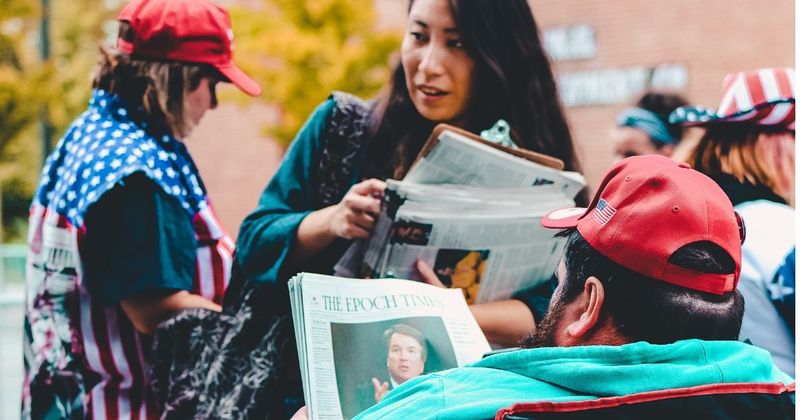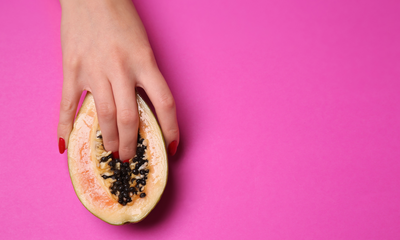This year has been a political and societal roller coaster of emotions. The pressure to vote, particularly for young people, comes with a serious responsibility that somehow seems to bare more weight than it ever did before. It’s a serious power that can stress a lot of us out. In addition, everyday we are seeing the country more and more divided. Besides the everyday conversations regarding LGTBQ rights, women oppression, racism and xenophobia, there are also disheartening reminders that we are divided as a country and that our humanity is constantly being threatened by political turmoil.
Our country is basically in the most unhealthy relationship it has ever been in with politics. And just like any unstable relationship, inconsistency and insecurity can lead to a variety of harmful effects to an individual trying to maneuver through this society.
Living in a 24/7 information overload era, we may have a difficult time escaping some of the bad news we so badly need to avoid. A 2016 study showed that the news stressed out those heavily digitally connected- young adults and the youth. A barrage of bad news has sparked fear, stress, paranoia and depression across the country. It’s gotten so bad that it now has an official name- Headline Stress Disorder. This is when a person suffers panic attacks and anxiety attacks caused by the 24-hour news cycle. The bad news we are surrounded by is usually a reminder of the constant attack POC are under.
Brandie Carlos, founder of Therapy for Latinx, an online safe space that helps you connect with a therapist specializing with the Latinx community, says POC are more vulnerable to the psychological effects of today’s politics. She explains that “when your basic human needs are threatened or unstable, it leaves you susceptible to mental health disorders like depression and anxiety. When you’re community is frozen from these mental health experiences it’s hard to see anyone thriving and that’s the whole reason many of us are in this country to being with.”
With the world moving fast and feeling seemingly unsafe for a lot of people, it’s important to be aware of effective and healthy coping strategies to get us through the day.
Something that can be beneficial to our coping strategies is knowing our own triggers and setting boundaries. Carlos explains how politics can directly affect oppressed communities.
“We all carry trauma with us that has a different story or root cause” she goes on to say “when the Trump administration stated that they want to remove trans identification the trans hotline received 4 times as many calls as normal. These announcements can trigger past trauma, and fear for our quality of life. Current events and controversies can be enough to affect people’s mental health on a daily basis. It’s important to check in on ourselves and the people we love.”

Certified Therapist, Michelle Gutierrez-Leyva runs her own practice – ‘Alma y Corazon’ based out of Oakland, California
While checking in with others can create a sense a community and can serve as a reminder that heavy emotions of fear and sadness are validated, we must also devote time for ourselves and recognize where we need to set boundaries and what wounds are still left to tend to. Marriage and Family Therapist, Michelle Gutiérrez-Leyva, explains how coping is a lot about recognizing our wounds. In fact, often times, our triggers will remind us that there is still neglected pain within ourselves. “We can take a look and see if there are wounds standing in our way that are weakening us and tend to them as gently and effectively as possible so that we are not as intimidated or triggered with the threats or tactics of our opponent. Having our mental health in a good place will give us strong self-esteems that will uplift our families and communities so that we can be positive and inspiring leaders. We can educate ourselves about the cyclical history of greed that the current administration is enacting in their attempts to steal the land from its rightful owners to further disenfranchise us and try to disempower us.”
 Educating ourselves can also tune out the non-stop noise of the news cycle. A news cycle that Gutiérrez-Leyva says that while heavy, is also only temporary. “When we hear bad news, it is this bigger picture we must remember. Nevertheless, unplugging and setting boundaries with both mainstream media and social media is a healthy form of regaining our perspective.”
Educating ourselves can also tune out the non-stop noise of the news cycle. A news cycle that Gutiérrez-Leyva says that while heavy, is also only temporary. “When we hear bad news, it is this bigger picture we must remember. Nevertheless, unplugging and setting boundaries with both mainstream media and social media is a healthy form of regaining our perspective.”
Another way to cope is to start off on the right note. Studies have shown that because we are bombarded with bad news, survival mechanisms start to kick in. One way a human survives chronic stress is by going numb. Which means we cope in passive manners and subconsciously begin to avoid the high levels of stress we are facing. When we wake up with the intention to absorb something healthy and beneficial, we are allowing ourselves to understand balance – the good and bad – and therefore avoiding from suppressing the bad all together. Gutiérrez-Leyva explains “I think having a good attitude and taking good care of our mental health is what is going to help us finish this race. The race is for the future, the environment, and our future generations.” She goes on to give a beautiful example of understanding and patience while dealing with an opponent: “In Colombia, the Kogi Indigenous community believes that we must look at the opponents as little brothers that are lacking education and wisdom. We are the bigger brother and we know what our environment and community need to thrive. We are going to heal and help them heal in return. I believe that the story is never over until something good happens.”
Here Are 5 Ways We Can Practice –
1. Setting boundaries
2. Sharing resources
3. Embracing each other’s concerns and fears
4. Recognizing our wounds
5. Ultimately our own self-awareness of our core values will help us shut out in this climate of opinion and noise- helps us maneuver in our day to day lives






